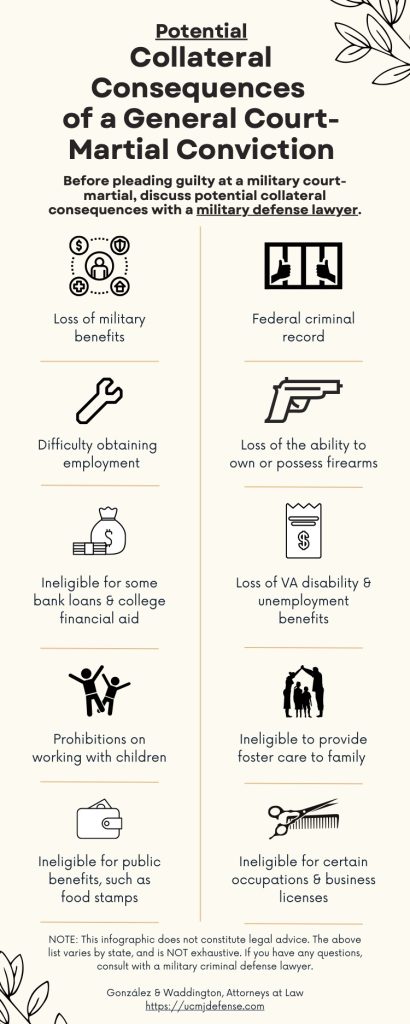What are the Collateral Consequences of a Federal Felony Conviction – Military Conviction?
A federal felony conviction carries numerous collateral consequences that can affect various aspects of a person’s life long after serving their sentence.
Here are some of the most significant collateral consequences of a Federal felony conviction/military conviction:
- Loss of Voting Rights: In many states, convicted felons lose their right to vote, sometimes permanently, although some states restore this right after completion of the sentence.
- Employment Restrictions: A felony conviction can make it difficult to find employment. Many employers conduct background checks and may be unwilling to hire individuals with a felony record. Certain professional licenses and certifications may also be revoked or denied.
- Loss of Professional Licenses: Felony convictions can result in the loss of professional licenses for occupations such as law, medicine, real estate, and teaching, among others.
- Ineligibility for Public Office: Convicted felons are often barred from holding public office.
- Firearms Restrictions: Federal law prohibits felons from owning, possessing, or purchasing firearms and ammunition.
- Loss of Public Benefits: Certain public benefits, such as federal student loans, welfare benefits, and housing assistance, may be denied to individuals with felony convictions.
- Immigration Consequences: Non-citizens convicted of a felony may face deportation, exclusion from re-entry into the United States, or denial of naturalization.
- Family Law Impacts: A felony conviction can affect parental rights and child custody arrangements.
- Travel Restrictions: Felons may face restrictions on their ability to travel internationally. Some countries deny entry to individuals with felony convictions.
- Social Stigma: Convicted felons often face social stigma and discrimination, which can affect personal relationships and community standing.
- Inability to Serve on a Jury: Felons are generally prohibited from serving on juries.
- Financial Consequences: Felony convictions can lead to significant fines, restitution, and the forfeiture of assets. Additionally, individuals may have difficulty obtaining credit or loans.
- Loss of Driver’s License: In some cases, felony convictions, particularly those related to DUI or drug offenses, can result in the suspension or revocation of a driver’s license.
- Educational Barriers: Convicted felons may be ineligible for certain scholarships or educational programs.
- Housing Restrictions: Felony convictions can make it difficult to find housing, as many landlords conduct background checks and may refuse to rent to individuals with a felony record.
Lesser-known collateral consequences of a criminal conviction include:
- ineligibility for public benefits, such as food stamps
- ineligibility for government-sponsored student loans and grants;
- restrictions on certain types of employment or occupational licenses;
- ineligibility to provide foster care to minor family members
- prohibitions on working with children
- loss of professional license or certification
- limitations on adoption or foster care

Infographic of Collateral Consequences of a Military Court-martial Conviction
COLLATERAL CONSEQUENCE
“Collateral consequence’’ means a collateral sanction or a disqualification.
COLLATERAL SANCTION
The term ‘‘collateral sanction’’
- means a penalty, disability, or disadvantage, however, denominated, that is imposed by law as a result of an individual’s conviction for a felony, misdemeanor, or other offense, but not as part of the judgment of the court; and
- does not include a term of imprisonment, probation, parole, supervised release, fine, assessment, forfeiture, restitution, or the costs of prosecution.
DISQUALIFICATION
The term ‘‘disqualification’’ means a penalty, disability, or disadvantage, however, denominated, that an administrative agency, official, or a court in a civil proceeding is authorized, but not required, to impose on an individual convicted of a felony, misdemeanor, or other offense on grounds relating to the conviction.
Ineligibility for public benefits, such as food stamps; ineligibility for government-sponsored student loans and grants; restrictions on certain types of employment or occupational licenses; and ineligibility to provide foster care to minor family members. While some consequences are limited to a certain type of offense, such as prohibitions on working with children.
